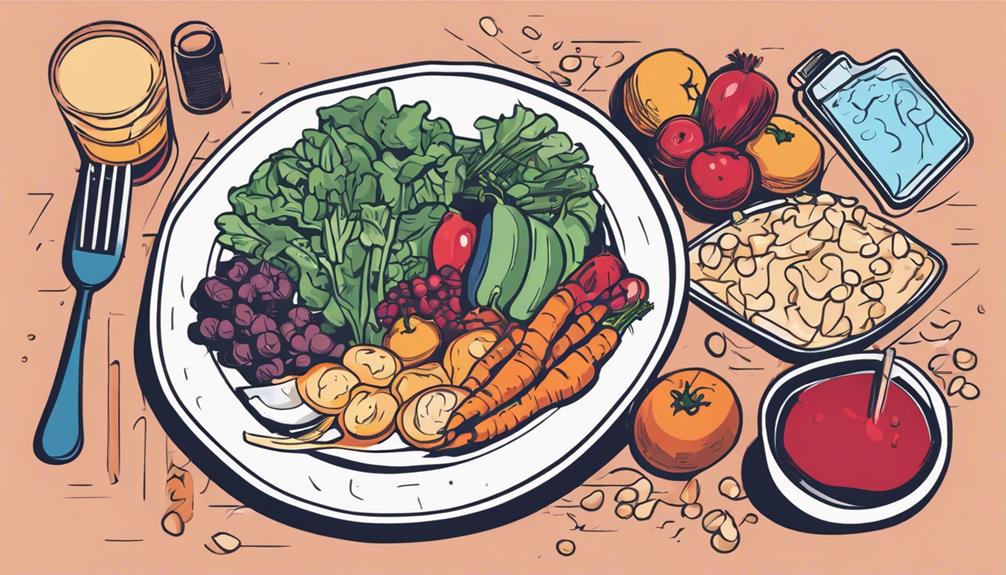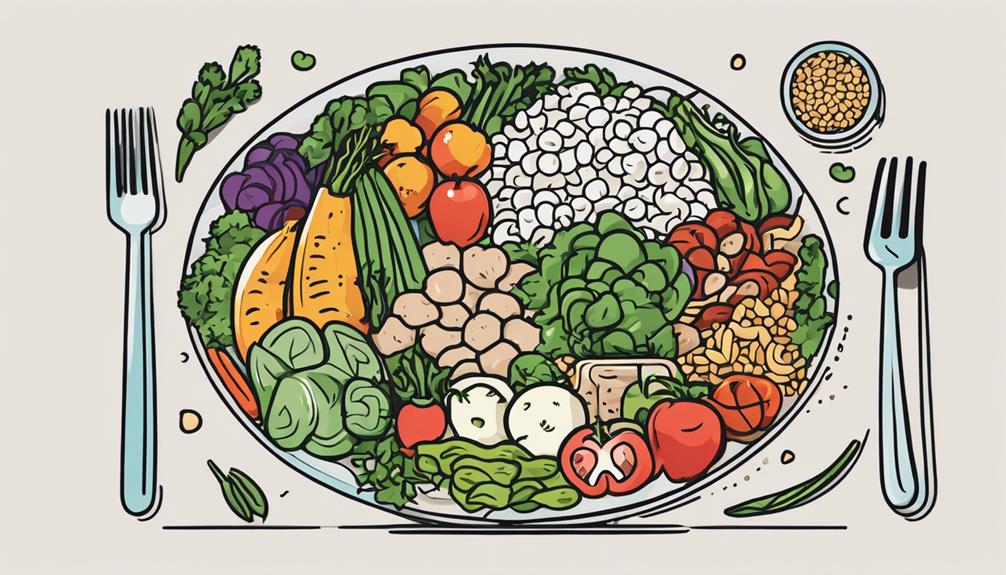When it comes to managing diabetes and blood sugar levels, you've likely heard the saying 'you are what you eat.' But what exactly does that mean for your meal planning?
Understanding the impact of balanced nutrition on your health is crucial, especially when dealing with diabetes. By focusing on key food groups, portion control, and smart snacking strategies, you can create a stable meal plan that supports your blood sugar levels.
But how do you ensure your meals are truly balanced and beneficial for your health?
Key Takeaways
- Prioritize balanced meals with carbs, proteins, and fats for stable blood sugar.
- Control portions to manage carb intake and regulate glucose levels effectively.
- Opt for nutrient-dense snacks rich in fiber, protein, and healthy fats.
- Plan meals with whole grains, lean proteins, and veggies for better diabetes management.
Importance of Balanced Diet

To effectively manage diabetes and maintain stable blood sugar levels, it's crucial to prioritize a balanced diet that includes a variety of nutrients. Benefits of following a balanced diet for diabetes management include better blood sugar control, improved energy levels, and reduced risk of complications. Nutrition education plays a vital role in understanding how different foods affect blood sugar levels and overall health.
A balanced diet consists of a mix of carbohydrates, proteins, and fats in appropriate proportions. Carbohydrates should mainly come from whole grains, fruits, vegetables, and legumes to provide fiber and essential nutrients. Proteins can be sourced from lean meats, poultry, fish, tofu, and legumes, while healthy fats from sources like avocados, nuts, seeds, and olive oil are beneficial for heart health.
Understanding the impact of portion sizes and meal timing is also essential. By learning to make healthier food choices and portion control, individuals can better manage their blood sugar levels and overall well-being. Incorporating a variety of nutrient-dense foods into your meals not only supports diabetes management but also contributes to better overall health.
Key Food Groups to Include
For effective diabetes management and blood sugar control, incorporating key food groups into your diet is essential to support your overall health and well-being. To optimize your meal plan, focus on including the following key food groups:
- Protein sources: Incorporating lean protein sources such as poultry, fish, tofu, and legumes can help regulate blood sugar levels and keep you feeling full and satisfied.
- Vegetables: Including a variety of colorful vegetables in your meals provides essential vitamins, minerals, and fiber. Vegetables like leafy greens, broccoli, tomatoes, and bell peppers are great choices.
- Carbohydrate choices: Opt for complex carbohydrates like whole grains, fruits, and starchy vegetables over refined sugars and processed foods. These choices provide sustained energy and help manage blood sugar levels.
- Healthy fats: Include sources of healthy fats such as avocados, nuts, seeds, and olive oil in your diet. These fats support heart health and can help with insulin sensitivity.
Portion Control Strategies

Utilizing portion control strategies is crucial in managing diabetes and regulating blood sugar levels effectively. By monitoring your portion sizes, you can better control your carbohydrate intake, which directly impacts blood sugar levels. Start by using smaller plates to naturally reduce portion sizes. Fill half your plate with non-starchy vegetables, one-quarter with lean proteins like chicken or fish, and the remaining quarter with whole grains or starchy vegetables. This method helps create balanced meals while controlling calorie intake.
Another helpful tip is to measure your food portions using measuring cups or a food scale. This allows for greater accuracy in controlling serving sizes. Additionally, being mindful of portion distortion – where oversized portions become the norm – is essential. Practice mindful eating by focusing on your meal without distractions, which can prevent overeating.
Developing healthy portion control habits is key to managing diabetes and promoting overall well-being. By incorporating these strategies into your daily routine, you can take control of your health and blood sugar levels effectively.
Smart Snacking Tips
Improve your snacking habits by choosing nutrient-dense options that help stabilize your blood sugar levels throughout the day. When it comes to smart snacking tips for managing diabetes and blood sugar, consider the following:
- Healthy choices: Opt for snacks that are rich in fiber, protein, and healthy fats to keep you full and prevent blood sugar spikes.
- Mindful eating: Pay attention to portion sizes and eat slowly to savor your snack, allowing your body to register fullness effectively.
- Incorporate variety: Mix and match different food groups to ensure a balanced intake of nutrients and prevent taste bud boredom.
- Plan ahead: Prepare healthy snacks in advance so that you have convenient options readily available, reducing the temptation to reach for less nutritious choices.
Meal Planning for Stability

Ensure stability in your blood sugar levels through strategic meal planning that focuses on nutrient-rich foods. Start your day with a balanced breakfast consisting of whole grains, lean protein, and healthy fats. For example, try oatmeal topped with Greek yogurt and nuts or scrambled eggs with avocado and whole grain toast.
Incorporate plenty of non-starchy vegetables like spinach, bell peppers, and broccoli into your meals to add fiber and essential nutrients without spiking blood sugar levels. For lunch and dinner, build your plate around lean protein sources such as grilled chicken, tofu, or fish, paired with complex carbohydrates like quinoa, sweet potatoes, or brown rice.
Experiment with different herbs and spices to add flavor without relying on salt or sugar. Snack on fresh fruits, nuts, or veggies to keep your energy levels stable throughout the day. Remember, meal planning is about balance and variety, so get creative with your meal ideas and find recipe inspiration to keep things interesting.
Frequently Asked Questions
How Can I Incorporate Cultural or Dietary Preferences Into a Balanced Meal Plan for Diabetes?
You can incorporate cultural or dietary preferences into a balanced meal plan for diabetes by making personalized adaptations. Enjoy traditional dishes with slight modifications to cater to dietary restrictions. This approach ensures you have a satisfying and diabetes-friendly meal.
Are There Any Specific Cooking Techniques or Methods That Can Help Retain the Nutritional Value of Food in a Diabetic Meal Plan?
To retain nutritional value in a diabetic meal plan, employ cooking techniques like steaming, baking, or grilling. These methods help preserve nutrients while enhancing flavors. Experiment with different approaches to find what suits your taste preferences and health goals.
Can Supplements or Vitamins Be Used to Enhance a Balanced Meal Plan for Diabetes and Blood Sugar Control?
When considering supplements or vitamins to enhance your balanced meal plan for diabetes and blood sugar control, consult your healthcare provider. Some supplements may be effective but can have side effects. Vitamins can interact with medications, so follow dosage recommendations carefully.
How Can I Navigate Social Situations or Dining Out While Following a Balanced Meal Plan for Diabetes?
When dining out or socializing, focus on meal prep and portion control. Stick to whole foods, avoid heavy sauces or excessive carbs. Politely decline temptations, opt for grilled proteins, veggies, and salads. Enjoy tasteful choices guilt-free.
Are There Any Specific Recommendations for Hydration and Beverage Choices in a Balanced Meal Plan for Diabetes?
To stay hydrated, focus on water intake throughout the day. Opt for sugar-free drinks like unsweetened tea or infused water. Limit sugary beverages. Make mindful beverage choices to support your balanced meal plan for diabetes.
Conclusion
In conclusion, maintaining a balanced meal plan is crucial for managing diabetes and blood sugar levels. Just like a well-oiled machine, your body needs the right fuel to function properly.
By including key food groups, practicing portion control, and smart snacking, you can help stabilize your blood sugar levels and improve overall health.
Remember, consistency is key in achieving your health goals. Stay committed to your meal plan and watch your health flourish like a blooming flower.